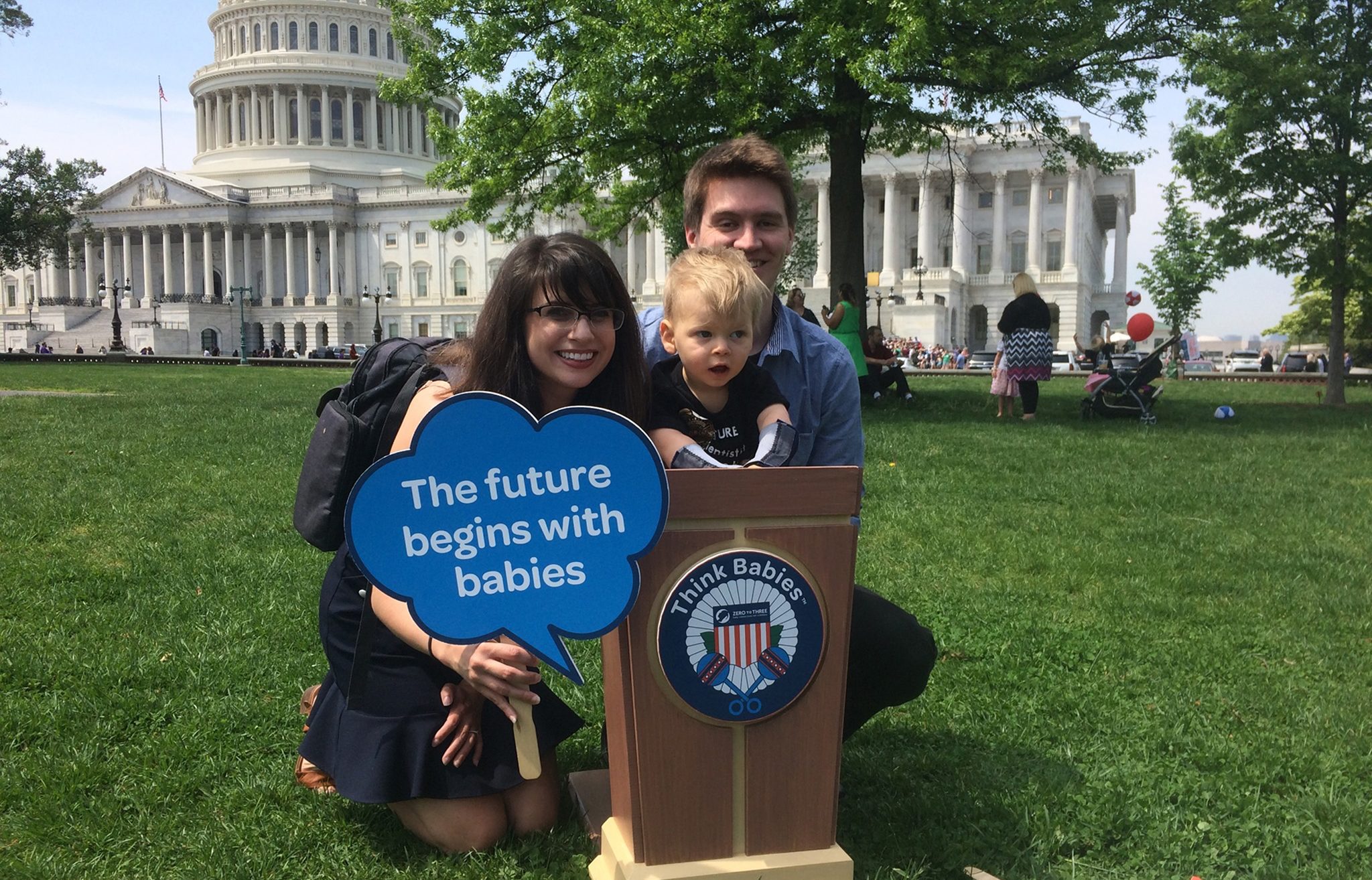
Emily McCauley (left), curator of education at the University of Mississippi Museum, traveled with and her son, Grey, and husband, Mark, to Washington, D.C., this summer to advocate for early intervention services and parental leave. Submitted photo
OXFORD, Miss. – The first years of a child’s life are the most influential on their development, which is why conducting a screening is important to see how a child is developing. However, only one in five parents say their child received a developmental screening, according to a study conducted by the Centers for Disease Control and Prevention.
Emily McCauley, curator of education at the University of Mississippi‘s University Museum and Historic Houses, has experienced firsthand how crucial it is to recognize developmental problems early on and tackle them through early intervention.
Her son, Grey, who was born last January, went without oxygen at some point during his delivery, causing brain damage that resulted in cerebral palsy, epilepsy, hypoxic ischemic encephalopathy and developmental delays. The family found help for Grey through early intervention services.
“If you haven’t experienced early intervention, you don’t really know what it is and what a tool it can be,” McCauley said. “Basically, it is that time from ages 0-3 where the brain is forming a million neuron connections a second.
“We know that babies are learning all the time and gaining new skills, but for kids like Grey, with traumatic brain injury or other developmental delays, early intervention can target those challenges and help the brain rewire around that injury.”
The Mississippi Department of Health’s Early Intervention Program grant allows UM communication sciences and disorders, or CSD, graduate students and certified speech-language pathologists to provide individual evaluations and treatment in the natural environment for children from birth to 3 years old who have developmental delays or diagnosed physical or mental conditions.
Rebecca Lowe, a clinical associate professor in CSD and principal investigator on the early intervention grant, explained how the program uses its grant to hire consultants to do evaluations and therapy as well as train Ole Miss graduate students who are studying to become speech-language pathologists.
“We have three speech-language pathologists, one special instructor and an occupational therapist,” she said. “The occupational therapist currently provides assessments only, but the other four will go into the homes or day cares and perform therapies for the children as needed.
“Consultants funded by the grant will evaluate a child, ages 0-3, and find out whether or not they would qualify for EI services due to developmental delays that would hinder their progress. If they do qualify, the Early Intervention program will give them appropriate services in their natural environment.”
The program also has a training component where graduate students can go with the speech-language pathologists and conduct evaluations. Meliah Grant, a CSD graduate student involved with the program, describes the program as one of a kind.
“It makes the therapy experience more authentic and impactful because you are actually using the resources in the child’s everyday environment, and you’re directly affecting change where they spend every day,” Grant said. “My supervisor, Amy Moore, and I serviced children ages 0-3 in Water Valley and Batesville in their most natural environments, including home and day care. We would spend up to an hour in the homes working on speech, language and/or swallowing.”
“One very unique thing about early intervention is the counseling aspect to it. When you’re in the homes, your relationships with the caregivers are equally as important as what you are focusing on with the child. You answer questions, give advice, and, most importantly, listen to their concerns and observations about what has been going on.”
For McCauley, the progress Grey made through his time with early intervention and the way its services have curbed long-term challenges for him led her and her husband to advocate for quality health care and early intervention.
“We were chosen as the family to represent Mississippi through the organization Zero to Three, which brings a family from every state to D.C. for their Strolling Thunder event,” McCauley said. “We met Sen. Roger Wicker, Sen. Cindy Hyde Smith and Rep. Trent Kelly.
“We were there to show them how the decisions they make at a federal level affects families and their home state.”
Their advocacy was also driven by their desire to make sure families realize that these kinds of resources exist and that kids are being tested.
“We realize what early intervention is doing for our family and we are trying to help others receive these services,” she said. “Roughly about 3 percent of kids are receiving these services but about 13 percent could benefit from them, so there is that 10 percent gap that we are trying to fill.”
The biggest issues are funding and screenings, McCauley said.
“There needs to be better methods of identifying kids with these issues,” she said. “A lot of times, it isn’t until they get older that you see these issues.
“Also, kids don’t get enough of the services because the funding is so little that the staff have to figure out how to stretch the little that they have, so if there was more funding then it wouldn’t have to be that a child receives less therapy sessions than needed, which is a lot of the cases.”
For students interested in studying communication sciences and disorders to help children like Grey meet their full potential, visit http://csd.olemiss.edu/.
The School of Applied Sciences, home of the Department of Communication Sciences and Disorders, offers professional preparation programs that integrate academic study, clinical training, creative research, service-learning and community outreach, leading to the development of leaders whose professional endeavors will improve health and well-being.